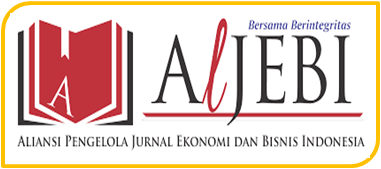Finance Performance: Reinvestigation through Intellectual Capital and Good Corporate Governance
Abstract
Intellectual Capital (IC) management needs to be carried out in banking because knowledge is an important need for a company whose operational activities directly interact with customers, so existing human resources must have adequate capabilities and knowledge. In addition to knowledge management, implementing Good Corporate Governance (GCG) to create company efficiency and reduce conflicts that arise provides transparency and legitimacy of company activities. This study aims to determine the influence of IC development on the financial performance of Islamic banking and to determine the impact of implementing GCG on the financial performance of Islamic banking in Indonesia. The results showed that simultaneously the variables of IC and GCG had a significant effect on financial performance (ROA). These findings indicate that Islamic banks need to manage knowledge sourced from their employees. In addition, this finding also explains that Islamic banking in Indonesia needs to consider the determination of the number of directors to maximize the duties and responsibilities of the directors in Islamic banking supervision.
Keywords
Full Text:
PDFReferences
Ahangar, R. G. (2011). The relationship between intellectual capital and financial performance: An empirical investigation in an Iranian company. African Journal of Business Management, 5(1), 88–95. https://doi.org/10.5897/AJBM10.712
Ajili, H., & Bouri, A. (2018). Corporate governance quality of Islamic banks: measurement and effect on financial performance. International Journal of Islamic and Middle Eastern Finance and Management, 11(3), 470–487. https://doi.org/10.1108/IMEFM-05-2017-0131
Alfraih, M. M. (2018). What drives intellectual capital reporting? Evidence from Kuwait. International Journal of Productivity and Performance Management, 67(3), 571–589. https://doi.org/10.1108/IJPPM-07-2016-0132
Aluchna, M. (2009). Does good corporate governance matter? Best practice in Poland. Management Research News, 32(2), 185–198. https://doi.org/10.1108/01409170910927631
Barney, J. (1991). Firm Resources and Sustained Competitive Advantage. Journal of Management, 17(1), 99–120.
Bontis, N. (1998). Intellectual capital: an exploratory study that develops measures and models. Management Decision, 36(2), 63–76. https://doi.org/10.1108/00251749810204142
Buallay, A. (2019). Intellectual capital and performance of Islamic and conventional banking: Empirical evidence from Gulf Cooperative Council countries. Journal of Management Development, 38(7), 518–537. https://doi.org/10.1108/JMD-01-2019-0020
Bukair, A. A., & Abdul Rahman, A. (2015). Bank performance and board of directors attributes by Islamic banks. International Journal of Islamic and Middle Eastern Finance and Management, 8(3), 291–309. https://doi.org/10.1108/IMEFM-10-2013-0111
Chartered Institute of Management Accountants. (2003). Understanding corporate value: managing and reporting intellectual capital. Chartered Institute of Management Accountants, 1–28.
Chowdhury, L. A. M., Rana, T., Akter, M., & Hoque, M. (2018). Impact of intellectual capital on financial performance: evidence from the Bangladeshi textile sector. Journal of Accounting and Organizational Change, 14(4), 429–454. https://doi.org/10.1108/JAOC-11-2017-0109
Dženopoljac, V., Janoševic, S., & Bontis, N. (2016). Intellectual capital and financial performance in the Serbian ICT industry. Journal of Intellectual Capital, 17(2), 373–396. https://doi.org/10.1108/JIC-07-2015-0068
Ferguson, K. L., & Reio, T. G. (2010). Human resource management systems and firm performance. Journal of Management Development, 29(5), 471–494. https://doi.org/10.1108/02621711011039231
Florackis, C. (2008). Agency costs and corporate governance mechanisms: Evidence for UK firms. International Journal of Managerial Finance, 4(1), 37–59. https://doi.org/10.1108/17439130810837375
Gigante, G. (2013). Intellectual Capital and Bank Performance in Europe. Accounting and Finance Research, 2(4), 120–129. https://doi.org/10.5430/afr.v2n4p120
Gillette, H. (2002). Planning Review. Journal of Planning History, 1(3), 266–269. https://doi.org/10.1177/153851320200100311
Holland, J. (2003). Intellectual capital and the capital market – organisation and competence. Accounting, Auditing & Accountability Journal, 16(1), 39–48. https://doi.org/10.1108/09513570310464264
Holland, J. (2010). Banks, knowledge and crisis: A case of knowledge and learning failure. Journal of Financial Regulation and Compliance, 18(2), 87–105. https://doi.org/10.1108/13581981011033961
Jensen, M. C., & Meckling, W. H. (1976). Theory of the Firm: Managerial. Journal of Financial Economics, 3, 305–360. https://doi.org/http://dx.doi.org/10.1016/0304-405X(76)90026-X
Kamath, B. (2008). Intellectual capital disclosure in India: content analysis of “TecK” firms. Journal of Human Resource Costing & Accounting, 12(3), 213–224. https://doi.org/10.1108/14013380810919859
López-Quesada, E., Camacho-Miñano, M. del M., & O. Idowu, S. (2018). Corporate governance practices and comprehensive income. Corporate Governance (Bingley), 18(3), 462–477. https://doi.org/10.1108/CG-01-2017-0011
Lu, K., Zhu, J., & Bao, H. (2015). High-performance human resource management and firm performance: The mediating role of innovation in China. Industrial Management & Data Systems, 115(2), 353–382.
Lukman, H., & Tanuwijaya, H. (2021). The Effect of Financial Performance and Intellectual Capital on Firm Value with CSR as a Mediating Variable in Banking Industry. Proceedings of the Ninth International Conference on Entrepreneurship and Business Management (ICEBM 2020), 174(Icebm 2020), 353–359. https://doi.org/10.2991/aebmr.k.210507.054
Mahrani, M., & Soewarno, N. (2018). The effect of good corporate governance mechanism and corporate social responsibility on financial performance with earnings management as mediating variable. Asian Journal of Accounting Research, 3(1), 41–60. https://doi.org/10.1108/ajar-06-2018-0008
Mangesti Rahayu, S. (2019). Mediation effects financial performance toward influences of corporate growth and assets utilization. International Journal of Productivity and Performance Management, 68(5), 981–996. https://doi.org/10.1108/IJPPM-05-2018-0199
Martilla, J. A., & James, J. C. (1977). Importance-Performance Analysis : An easily-applied technique for measuring attribute importance and performance can further the development of effective marketing programs. Journal of Marketing, 2(4), 77–79.
Maztoul, S. B. (2014). Does corporate governance matter in meeting and beating analysts’ forecasts. International Journal of Business and Management, 14(2), 276–290.
Mention, A. L., & Bontis, N. (2013). Intellectual capital and performance within the banking sector of Luxembourg and Belgium. Journal of Intellectual Capital, 14(2), 286–309. https://doi.org/10.1108/14691931311323896
Mollah, S., Hassan, M. K., Al Farooque, O., & Mobarek, A. (2017). The governance, risk-taking, and performance of Islamic banks. Journal of Financial Services Research, 51(2), 195–219. https://doi.org/10.1007/s10693-016-0245-2
Mudjijah, S., Khalid, Z., & Astuti, D. A. S. (2019). Pengaruh Kinerja Keuangan dan Struktur Modal Terhadap Nilai Perusahaan yang Dimoderasi Variabel Ukuran Perusahaan. Jurnal Akuntansi Dan Keuangan, 8(1), 2252–7141. https://doi.org/10.1017/CBO9781107415324.004
Navarro, M., & Ansón, S. (2009). Do families shape corporate governance structure? Journal of Management & Organization, 16(3), 327–345.
Nawaz, T., & Haniffa, R. (2017). Determinants of financial performance of Islamic banks: an intellectual capital perspective. Journal of Islamic Accounting and Business Research, 8(2), 130–142. https://doi.org/10.1108/JIABR-06-2016-0071
Neves, E., & Proença, C. (2021). Intellectual capital and financial performance: Evidence from Portuguese banks. International Journal of Learning and Intellectual Capital, 18(1), 93–108. https://doi.org/10.1504/IJLIC.2021.113658
Nguyen, T., Locke, S., & Reddy, K. (2014). A dynamic estimation of governance structures and financial performance for Singaporean companies. Economic Modelling, 40, 1–11. https://doi.org/10.1016/j.econmod.2014.03.013
Nikolaj Bukh, P. (2003). The relevance of intellectual capital disclosure: A paradox? Accounting, Auditing & Accountability Journal, 16(1), 49–56. https://doi.org/10.1108/09513570310464273
Nimtrakoon, S. (2015). The Relationship Between Intellectual Capital, Firms’ market value and Financial Performance: Empirical evidence from the ASEAN. Journal of Intellectual Capital, 16(3), 587–618.
Nuryaman. (2015). The Influence of Intellectual Capital on The Firm’s Value with The Financial Performance as Intervening Variable. Procedia - Social and Behavioral Sciences, 211(September), 292–298. https://doi.org/10.1016/j.sbspro.2015.11.037
Ofoeda, I. (2016). and non-bank financial institutions profitability Corporate Governance International Journal of Law and Management.
Olarewaju, O. M., & Msomi, T. S. (2021). Intellectual capital and financial performance of South African development community’s general insurance companies. Heliyon, 7(4), e06712. https://doi.org/10.1016/j.heliyon.2021.e06712
Orazalin, N., Mahmood, M., & Jung Lee, K. (2016). Corporate governance, financial crises and bank performance: lessons from top Russian banks. Corporate Governance (Bingley), 16(5), 798–814. https://doi.org/10.1108/CG-10-2015-0145
Palaniappan, G. (2017). Determinants of corporate financial performance relating to board characteristics of corporate governance in Indian manufacturing industry: An empirical study. European Journal of Management and Business Economics, 26(1), 67–85. https://doi.org/10.1108/EJMBE-07-2017-005
Pfeffer, J. (1995). Producing sustainable competitive advantage through the effective management of people. Academy of Management Perspectives, 9(1), 55–69. https://doi.org/10.5465/ame.1995.9503133495
Pulic, A. (2004). Intellectual capital – does it create or destroy value? Measuring Business Excellence, 8(1), 62–68. https://doi.org/10.1108/13683040410524757
Rechberg, I., & Syed, J. (2013). Ethical issues in knowledge management: Conflict of knowledge ownership. Journal of Knowledge Management, 17(6), 828–847. https://doi.org/10.1108/JKM-06-2013-0232
Saidat, Z., Silva, M., & Seaman, C. (2019). The relationship between corporate governance and financial performance: Evidence from Jordanian family and nonfamily firms. Journal of Family Business Management, 9(1), 54–78. https://doi.org/10.1108/JFBM-11-2017-0036
Salam, A. (2014). Manajemen Insani Dalam Bisns. Pustaka Pelajar.
Sardo, F., & Serrasqueiro, Z. (2018). Intellectual capital, growth opportunities, and financial performance in European firms: Dynamic panel data analysis. Journal of Intellectual Capital, 19(4), 747–767. https://doi.org/10.1108/JIC-07-2017-0099
Ulum, I. (2013). Model Pengukuran Kinerja Intellectual Capital Dengan Ib-Vaic Di Perbankan Syariah. Inferensi, 7(1), 185. https://doi.org/10.18326/infsl3.v7i1.185-206
Ur Rehman, A., Aslam, E., & Iqbal, A. (2022). Intellectual capital efficiency and bank performance: Evidence from islamic banks. Borsa Istanbul Review, 22(1), 113–121. https://doi.org/10.1016/j.bir.2021.02.004
Weqar, F., Khan, A. M., Raushan, M. A., & Haque, S. M. I. (2021). Measuring the Impact of Intellectual Capital on the Financial Performance of the Finance Sector of India. Journal of the Knowledge Economy, 12(3), 1134–1151. https://doi.org/10.1007/s13132-020-00654-0
Xu, J., & Liu, F. (2021). Nexus between intellectual capital and financial performance: An investigation of chinese manufacturing industry. Journal of Business Economics and Management, 22(1), 217–235. https://doi.org/10.3846/jbem.2020.13888
Zainal, R. V., Basalamah, S., & Muhammad, N. (2014). Islamic Human Capital Management (Manajemen Sumber Daya Insani: cara tepat dan mudah dalam menerapkan manajemen sumber daya insani dalam perusahaan secara islami. PT. Rajagrafindo Persada.
DOI: https://doi.org/10.18860/miec.v2i2.18358
Refbacks
- There are currently no refbacks.

This work is licensed under a Creative Commons Attribution-ShareAlike 4.0 International License.
Editorial Office:
Megawati Soekarnoputri Building
Faculty of Economics
Jln. Gajayana 50 Telp (0341) 558881
E-mail: m-iecjournal@uin-malang.ac.id
UIN Maulana Malik Ibrahim Malang
Member of:
Indexed by:
Maliki Islamic Economics Journal under a CC BY SA 4.0 International License.
View My Stats


























